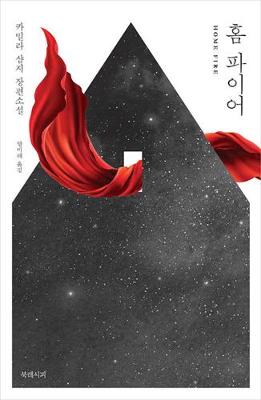Reviewed by nannah on
Content warnings:
- Islamophobia & racism
- fetishization (of the hijab)
Representation:
- most of the characters are British and Pakistani
Home Fire tells the story of two British families, both of Pakistani origins. One is the Pasha family, consisting of the three orphaned siblings: Isma, Aneeka, and Parvaiz, all children of a jihadist father. Isma has just moved to America to pursue a dream she has long put off to take care of her siblings, leaving Aneeka and Parvaiz, both twins, behind. While Aneeka doesn’t seem to mind, Parvaiz feels abandoned, and then feels their family further break apart when Aneeka reveals hints about wanting to leave. Isma’s worries about them turn out to be justified when Parvaiz follows in their father’s footsteps.
Then Eamonn Lone, son of the conservative British MP, falls for Aneeka. And Aneeka clings at the little bit of hope that she can get her brother back.
This one’s hard for me to review. While I became very much invested in the story into the second half, I nearly DNF’d it because of the first. It also does that thing I’ve seen people talk about lately (but shouldn’t expand upon, because I’m not Muslim) where it divides Muslims into clear Good or Bad groups -- though that possibly also contributes to its mass appeal, because I’m like 95% sure this was written for a largely white, Christian audience in mind.
The book is divided into sections with different PoVs, starting with Isma with the strongest chapter. Unfortunately, after this fantastic beginning, the prose becomes bogged down with what seems like an exercise involving cumbersome language and a thesaurus: “By midafternoon the temperature had passed the 50 degree Fahrenheit mark, which sounded, and felt, far warmer than 11 degrees Celsius [...]. Isma tilted her post-lunch mug of coffee toward herself, touched the tip of her finger to the liquid, considered how much of a faux pas it might be to ask to have it microwaved. She had just decided she would risk the opprobrium when the door opened …” I understand the desire to differentiate the style of the PoVs, but this is the only one where a distinct style is apparent, and it still needs to be … pleasing. Especially if it’s the opening one. I couldn’t stand it.
The other PoVs are much better and sucked me in (except for Eamonn’s … which … has some uncomfortable fetishistic views toward hijabs and hijabis, although I largely contribute that done to show his character development later on. It still is, uh … not the greatest to read, though this is extremely subjective and obviously not a common opinion).
Surprisingly, the most interesting PoV is Karamat Lone’s, Eamonn’s father. I didn’t like him at all, but getting inside his head, his motivations, and eventually his change of consciousness was a pleasure to read. I think his development is the most well realized, though I don’t think the characters’ arcs are given great focus.
I wasn’t surprised this was a retelling, because it does feel like it’s following a script a bit. Things become a little bit too shiny and polished, conversations are a little too planned, etc.
These are minor things. The novel really did engage me in the second half, and held my attention until the very startling ending.
Reading updates
- Started reading
- 6 October, 2021: Finished reading
- 6 October, 2021: Reviewed
